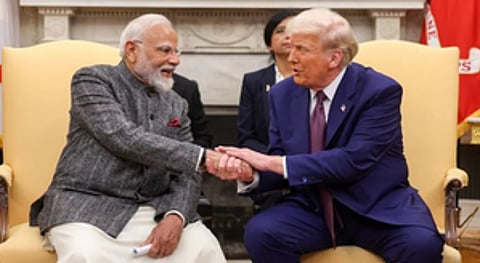

NEW DELHI: A day after US President Donald Trump reiterated his threat to impose reciprocal tariffs on India starting April 2, the Ministry of External Affairs (MEA) said on Friday that both countries are actively working on a Bilateral Trade Agreement (BTA) to expand trade, enhance market access, strengthen supply chains and reduce tariff and non-tariff barriers.
MEA spokesperson Randhir Jaiswal said: “The two governments are working to build a framework for the BTA, which aims to expand trade, enhance market access, and reduce tariff and non-tariff barriers… The government of India remains engaged with the US administration at various levels to reach a mutually beneficial multi-sector bilateral trade agreement.”
He added, “In this endeavour, our minister of commerce and industry visited the US from March 3 to 7 and held discussions with the US secretary of commerce and US trade representative.” Jaiswal, however, did not directly respond to queries on whether India is expecting some kind of a waiver from Trump’s reciprocal tariff that comes into effect on April 2.
President Trump said on Thursday that India will face reciprocal tariffs starting April 2, a move likely to impact India’s exports of agricultural and pharmaceutical goods, which have a significant tariff differential with the US.
“I have a very good relationship with India, but the only problem I have with India is that they are one of the highest tariffing nations in the world. I believe they are probably going to lower those tariffs substantially, but on April 2, we will be charging them the same tariffs they charge us,” Trump said in an interview with US-based Breitbart News.
The US president’s tariff tussle has stoked fears of a global trade war, with many countries already announcing counter-measures to deal with it. Following talks between Prime Minister Narendra Modi and Trump in Washington DC last month, the two sides announced that the first tranche of the BTA would be negotiated by the fall of 2025.
Meanwhile, answering to a question on improving ties with Canada, the MEA spokesperson pointed out that the downturn in its bilateral relations with Canada was due to the “licence” granted to “extremist and secessionist elements” in the country. With a change of guard in Canada, the spokesperson expressed hope that the relationship could be rebuilt based on mutual trust and sensitivity. These remarks come amid a change in leadership in Ottawa, with Mark Carney replacing Justin Trudeau as prime minister.
Ahead of his swearing-in, Carney has said: “What Canada will be looking to do is diversify our trading relationships with like-minded countries. There are opportunities to rebuild the relationship with India—there needs to be a shared sense of values around that commercial relationship, and if I am the Prime Minister, I look forward to the opportunity to build that.”
Relations between India and Canada deteriorated after Justin Trudeau, Carney’s predecessor, in 2023 accused Indian government agents of involvement in the killing of pro-Khalistani extremist Hardeep Singh Nijjar in Surrey, British Columbia. India strongly denied the allegations, with the Ministry of External Affairs stating that Canada had “presented us no evidence” to back the serious charges made against India and its diplomats. In response to the controversy, both nations recalled their diplomats in a tit-for-tat move.